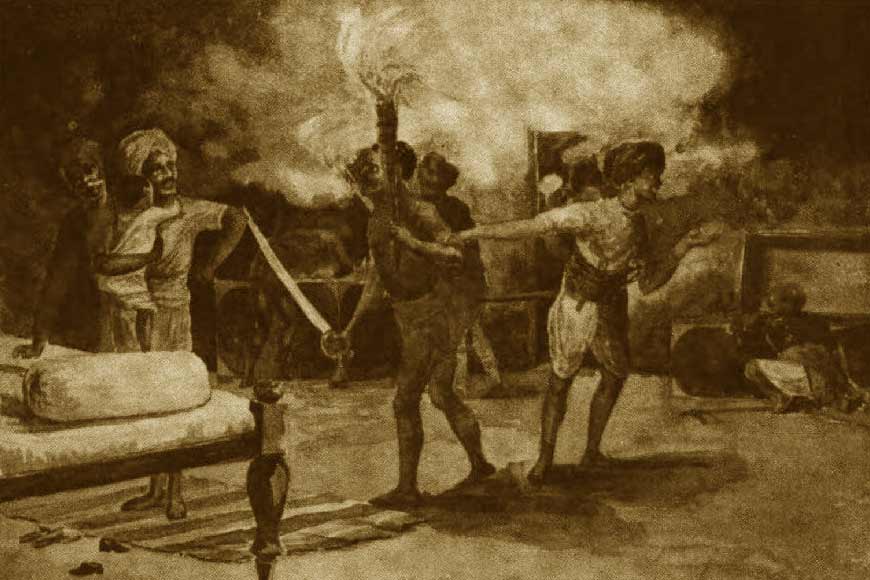Raghu Dakat – how he turned a disciple of singer Ramprasad

In this 3-part series GB explores the tales of famous dacoits of Bengal in the 18th and 19th centuries, who were cult figures like Robin Hood! From Raghu, Bishe, Rana, Bede to Bhabani Pathak, the list is endless. But why did they take up banditry? Was it poverty or English indigo planters and their torture that forced them to turn dacoits? This part talks about the exploits of famous Raghu Dakat and how he transformed hearing singer Ramprasad’s rendition of Shyamasangeet
Raghu was notorious for sending notes to his victims, days in advance, specifying the date and time of his arrival for looting and arsenal. Durgacharan Chakraborty was a very strict disciplinarian police officer. He was the officer-in-charge of Naihati police station and a close friend of the Landlord of Sukhsagar. The zamindar had requested Chakraborty to nab Raghu, who was a menace in the locality. But Raghu remained elusive, slippery as eel. Suddenly, Chakraborty received a letter from the bandit. The cryptic note said, “Daroga Babu, I am coming to meet you. Yours’ Raghu Ghosh.”
The OC was stunned. He was crossing swords with the police force! Chakraborty sent requisition for more force and tightened the security of the police station. He was determined to arrest the culprit this time. One day, a fisherman came to meet the officer with two huge rohu fish and a note. He said the landlord had sent this gift and handed him the note. The note read thus: “On the occasion of the landlord’s grandson’s rice ceremony, we were fishing in the pond. You had said you would not be able to attend the function, so I am sending you this pair of fish for you through my trusted subject.” The OC was overjoyed and tipped the fisherman generously before seeing him off. A few days later, the OC received another note. It said, “Daroga Babu, I had promised you I would meet you in person, and I did that. Hope you enjoyed your sumptuous meals with the fish gifted to you. Yours’ truly, Raghu Dacoit.
In the last decades of the 19th century, a new genre of writing originated in Bengal with the emergence of narratives of seemingly true criminal investigations compiled by real life darogas (officer-in-charge of local police station) like Girish Chandra Bose, Priyanath Mukhopadhyay, and Bakaullah. Girish Chandra Bose’s celebrated autobiographical book, ‘Sekaler Darogar Kahini’ gives graphic details of cases he handled during his long and eventful professional career. He reminisces, “During the time about which I have been writing, in almost all districts of Bengal, dacoity was endemic, and although the practice of Raghunath, Baidyanath or Biswanath committing dacoities after giving prior notice had declined to some extent during the ï¬rst part of English rule, dacoities committed with cruelty and inhumane actions were still common in Bengal. What had been earned or saved in a life’s time could be looted in one night, but wealth or belonging was not the only casualty, the life of the householder was also at stake.”
Raghu’s expeditions continued undeterred. He and his team adhered to certain norms strictly – they never harmed the poor or the elderly, women and children. His ire was directed towards oppressors who amassed wealth by exploiting and cheating the poor. Whatever they accumulated during their raids, they distributed among the needy. Raghu was highly esteemed and loved by the poor. He was worshiped as a demigod. Whoever sought any help from him, he never disappointed them. His Robin Hood-like image brought him closer to the masses who shielded him from all harm.
Raghu was a devout worshiper of Goddess Kali. According to folklore, once Raghu was being chased by the British police force from Nadia and to evade arrest, Raghu and his men took refuge in Pandua. However, they decided to shift base since this was a residential area and entered the dense jungles of neighboring Devipur. Raghu’s brother, Bidhubhushan was also a member of Raghu’s band of bandits. When they were camping in the jungles, Raghu had a strange yearning – he became restless and wanted to set up a human settlement in the middle of the forest. He arranged everything and then at the dead of night set out to convince five Brahmin families to accompany him to the newly-formed village in the forest. The village was christened Nishinagar because it was established at night.
Later the name was changed to Nishiragarh. It is also believed that Raghu camped in the dense forest of Attahas in Ketugram. One day as he was walking along a pond, when he noticed two stone sculpted idols. One was that of Shiva but the other one he could not identify. That very night Goddess Kali appeared in Raghu’s dream and ordered him to organize a ceremony of consecration of the idol. Raghu did as he was told and since then he became a devotee of Kali and worshipped the idol regularly. ‘Loitya mach (Bombay duck) was roasted and offered to the goddess as ‘bhog.’ Raghu and his men would offer special puja and then devour the roasted fish before undertaking any expedition. The tradition of offering roasted Bombay duck fish to Goddess Kali is followed in many temples to this day.
On the auspicious day of Magh Chaturdashi (14th day) of New Moon day, the worship of Ratanti Kali is performed with pomp and splendor at Ketugram. It is believed that Raghu Dakat worshipped this Kali on the new moon night in the month of Kartik. He used to offer human sacrifices as part of the puja ritual of Goddess Kali. He would capture any stranger who was spotted in the jungle on the fateful day of Kartik and tie him up to slaughter him during the puja. However, Ramprasad Sen, a renowned poet/singer and devotee of Goddess Kali happened to pass by the temple in the jungle on the crucial day. As soon as Raghu’s gang members spotted him, they held him and kept him for offering to the goddess as a sacrifice. Ramprasad pleaded to Raghu Dakat to allow him to sing his last offering to the goddess. Raghu agreed to fulfill Ramprasad’s dying wish. As soon as Ramprasad began his rendition, the entire gang, including Raghu, stood transfixed. Raghu had a vision of the divine mother waiting at the sacrificial altar, ready for beheading. He was shocked and submitted to the divine mother and begged for her forgiveness and promised to stop the ritual of human sacrifice. Thereafter, Raghu became an ardent follower of Ramprasad.
There are myriad such stories and myths surrounding Raghu’s exploits. In fact, the legend of the ‘Messiah of the poor’ has long surpassed the fame of Raghu the outlaw. Manohar Dakat, another infamous bandit used to worship a small one-ft high Kali idol and later built the Kali temple on Purna Das Road in South Kolkata but even this temple is attributed to Raghu! In fact, there are many more such temples in Burdwan, Murshidabad, Birbhum and Hooghly districts which are attributed to Raghu. Today his name is part of folklore and children’s literature.
(concluded)









